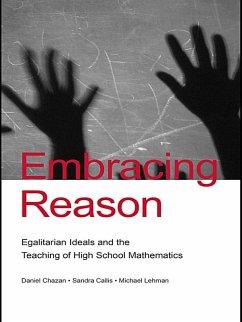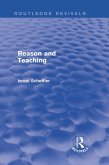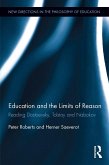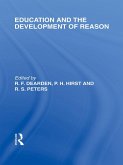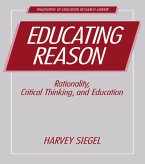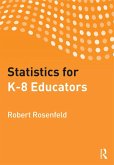Daniel Chazan, Sandra Callis, Michael Lehman
Embracing Reason (eBook, ePUB)
Egalitarian Ideals and the Teaching of High School Mathematics
30,95 €
30,95 €
inkl. MwSt.
Sofort per Download lieferbar

15 °P sammeln
30,95 €
Als Download kaufen

30,95 €
inkl. MwSt.
Sofort per Download lieferbar

15 °P sammeln
Jetzt verschenken
Alle Infos zum eBook verschenken
30,95 €
inkl. MwSt.
Sofort per Download lieferbar
Alle Infos zum eBook verschenken

15 °P sammeln
Daniel Chazan, Sandra Callis, Michael Lehman
Embracing Reason (eBook, ePUB)
Egalitarian Ideals and the Teaching of High School Mathematics
- Format: ePub
- Merkliste
- Auf die Merkliste
- Bewerten Bewerten
- Teilen
- Produkt teilen
- Produkterinnerung
- Produkterinnerung

Bitte loggen Sie sich zunächst in Ihr Kundenkonto ein oder registrieren Sie sich bei
bücher.de, um das eBook-Abo tolino select nutzen zu können.
Hier können Sie sich einloggen
Hier können Sie sich einloggen
Sie sind bereits eingeloggt. Klicken Sie auf 2. tolino select Abo, um fortzufahren.

Bitte loggen Sie sich zunächst in Ihr Kundenkonto ein oder registrieren Sie sich bei bücher.de, um das eBook-Abo tolino select nutzen zu können.
This book tells a single story, in many voices, about a serious and sustained set of changes in mathematics teaching practice in a high school and how those efforts influenced and were influenced by a local university. It challenges us to rethink boundaries between theory and practice and the relative roles of teachers and university faculty in educational endeavors.
- Geräte: eReader
- mit Kopierschutz
- eBook Hilfe
- Größe: 1.09MB
Andere Kunden interessierten sich auch für
![Reason and Teaching (Routledge Revivals) (eBook, ePUB) Reason and Teaching (Routledge Revivals) (eBook, ePUB)]() Israel SchefflerReason and Teaching (Routledge Revivals) (eBook, ePUB)40,95 €
Israel SchefflerReason and Teaching (Routledge Revivals) (eBook, ePUB)40,95 €![Education and the Limits of Reason (eBook, ePUB) Education and the Limits of Reason (eBook, ePUB)]() Peter RobertsEducation and the Limits of Reason (eBook, ePUB)45,95 €
Peter RobertsEducation and the Limits of Reason (eBook, ePUB)45,95 €![Systems of Reason and the Politics of Schooling (eBook, ePUB) Systems of Reason and the Politics of Schooling (eBook, ePUB)]() Systems of Reason and the Politics of Schooling (eBook, ePUB)39,95 €
Systems of Reason and the Politics of Schooling (eBook, ePUB)39,95 €![Education and the Development of Reason (International Library of the Philosophy of Education Volume 8) (eBook, ePUB) Education and the Development of Reason (International Library of the Philosophy of Education Volume 8) (eBook, ePUB)]() Education and the Development of Reason (International Library of the Philosophy of Education Volume 8) (eBook, ePUB)51,95 €
Education and the Development of Reason (International Library of the Philosophy of Education Volume 8) (eBook, ePUB)51,95 €![Educating Reason (eBook, ePUB) Educating Reason (eBook, ePUB)]() Harvey SiegelEducating Reason (eBook, ePUB)51,95 €
Harvey SiegelEducating Reason (eBook, ePUB)51,95 €![Primary Mathematics Pedagogy at the Intersection of Education Reform, Policy, and Culture (eBook, ePUB) Primary Mathematics Pedagogy at the Intersection of Education Reform, Policy, and Culture (eBook, ePUB)]() Sarah MurrayPrimary Mathematics Pedagogy at the Intersection of Education Reform, Policy, and Culture (eBook, ePUB)42,95 €
Sarah MurrayPrimary Mathematics Pedagogy at the Intersection of Education Reform, Policy, and Culture (eBook, ePUB)42,95 €![Statistics for K-8 Educators (eBook, ePUB) Statistics for K-8 Educators (eBook, ePUB)]() Robert RosenfeldStatistics for K-8 Educators (eBook, ePUB)51,95 €
Robert RosenfeldStatistics for K-8 Educators (eBook, ePUB)51,95 €-
-
-
This book tells a single story, in many voices, about a serious and sustained set of changes in mathematics teaching practice in a high school and how those efforts influenced and were influenced by a local university. It challenges us to rethink boundaries between theory and practice and the relative roles of teachers and university faculty in educational endeavors.
Dieser Download kann aus rechtlichen Gründen nur mit Rechnungsadresse in A, B, BG, CY, CZ, D, DK, EW, E, FIN, F, GR, HR, H, IRL, I, LT, L, LR, M, NL, PL, P, R, S, SLO, SK ausgeliefert werden.
Produktdetails
- Produktdetails
- Verlag: Taylor & Francis eBooks
- Seitenzahl: 400
- Erscheinungstermin: 16. Dezember 2009
- Englisch
- ISBN-13: 9781136965616
- Artikelnr.: 42983075
- Verlag: Taylor & Francis eBooks
- Seitenzahl: 400
- Erscheinungstermin: 16. Dezember 2009
- Englisch
- ISBN-13: 9781136965616
- Artikelnr.: 42983075
- Herstellerkennzeichnung Die Herstellerinformationen sind derzeit nicht verfügbar.
Daniel Chazan, Sandra Callis, Michael Lehman
Preface: Mathematics and Egalitarian Ideals
School Mathematics and Egalitarian Ideals: A Focus on Reason(s)
Acknowledgements
1 Introduction to Our Case Study
Our Goals and Our Own Voices
The Importance of Teacher Development
A School-University PDS Two-Way Relationship
The Structure of this Case Study and Its Included Texts
Part I Changes in Classroom Teaching Practice
2 Assessment
Mathematics Performance Assessment
Alternative Formats and A Taxonomy of Tasks
3 Curriculum and Instructional Models
Starting a Functions-Based Approach to Algebra
Perspectives on Holt Algebra 1 from the Department Chair and a Newer
Teacher
4 Planning
Teacher as Course-Level Planner
Must Teachers' Create Curriculum? For Every Class?
5 Interlude A: On-campus Preservice Assignments
TE 804 Reflection and Inquiry in Teaching Practice II
Preservice Teachers as Curriculum Makers
Should Preservice Teachers be Encouraged to Create Curriculum?
6 Instructional Tasks
Finding Mathematics in the World Around Us
Getting Past Lame Justifications!
7 Classroom Roles
One Teacher's Transformation in Teaching
What Teachers Think is Important!
Part II Student Experience of the Curriculum
8 Lower Track Classes
From an E to an A with the Help of a Graphing Calculator
How Important are Calculators?
9 Standard Track Classes
Students' views of mathematical conversation
CURRICULUM
PATTERN OF TEACHING/LEARNING
CONCEPTION OF MATHEMATICS
Managing Students' Participation in Classroom Conversation
10 Advanced Coursework
Developing an Interest in Mathematics
What is "mathematical power"? Related dilemmas of teaching
11 Interlude B: Observation in Classrooms
Field Experience really was the Best Teacher!
Our Contrasting Preservice Field Experiences
12 Interlude C: Student Teaching/Internship
What Kind of Teacher Will I Be?
How Do We Talk with Other Teachers about Our "Holt" Experiences?
Part III Professional Growth and Development
13 Time and Respect
Being Treated (and Treating Ourselves) as Professionals
Thoughts from Latecomers
14 Restructuring Teacher Work
Shared Teaching Assignments
What Do Shared Teaching Assignments Tell Us about Learning while Teaching?
15 Departmental Culture
One Transformed Teacher's Viewpoint
Elementary Mathematics can be Complex and Interesting!
16 Changing the Math Curriculum
Teaching a Technologically-Supported Approach to School Algebra
Thoughts on Where to Start
17 Learning from Students and Colleagues
Questioning Ourselves and the Authorities
Should We Ever Tell Mathematical White Lies to Our Students?
18 Interlude D: Learning Math from Coursework Conversation
Lines and points
Comments from Some Former "Students"
19 Participation in Teacher Education
Becoming a Professional Teacher; Being a Mentor Teacher
Being a Mentor Teacher is Hard Work!
20 Graduate Study
Theory is Practical!
The Role of Views of Mathematics in Teaching
Part IV Stepping back: The perspective of a local "outsider"
21 A Quiet Revolution? Reflecting on Mathematics Reform at Holt High School
Epilogue
Cast of Characters
Editors
Teacher authors and responders
Teacher responders
Holt student authors
Non-Holt authors
References
School Mathematics and Egalitarian Ideals: A Focus on Reason(s)
Acknowledgements
1 Introduction to Our Case Study
Our Goals and Our Own Voices
The Importance of Teacher Development
A School-University PDS Two-Way Relationship
The Structure of this Case Study and Its Included Texts
Part I Changes in Classroom Teaching Practice
2 Assessment
Mathematics Performance Assessment
Alternative Formats and A Taxonomy of Tasks
3 Curriculum and Instructional Models
Starting a Functions-Based Approach to Algebra
Perspectives on Holt Algebra 1 from the Department Chair and a Newer
Teacher
4 Planning
Teacher as Course-Level Planner
Must Teachers' Create Curriculum? For Every Class?
5 Interlude A: On-campus Preservice Assignments
TE 804 Reflection and Inquiry in Teaching Practice II
Preservice Teachers as Curriculum Makers
Should Preservice Teachers be Encouraged to Create Curriculum?
6 Instructional Tasks
Finding Mathematics in the World Around Us
Getting Past Lame Justifications!
7 Classroom Roles
One Teacher's Transformation in Teaching
What Teachers Think is Important!
Part II Student Experience of the Curriculum
8 Lower Track Classes
From an E to an A with the Help of a Graphing Calculator
How Important are Calculators?
9 Standard Track Classes
Students' views of mathematical conversation
CURRICULUM
PATTERN OF TEACHING/LEARNING
CONCEPTION OF MATHEMATICS
Managing Students' Participation in Classroom Conversation
10 Advanced Coursework
Developing an Interest in Mathematics
What is "mathematical power"? Related dilemmas of teaching
11 Interlude B: Observation in Classrooms
Field Experience really was the Best Teacher!
Our Contrasting Preservice Field Experiences
12 Interlude C: Student Teaching/Internship
What Kind of Teacher Will I Be?
How Do We Talk with Other Teachers about Our "Holt" Experiences?
Part III Professional Growth and Development
13 Time and Respect
Being Treated (and Treating Ourselves) as Professionals
Thoughts from Latecomers
14 Restructuring Teacher Work
Shared Teaching Assignments
What Do Shared Teaching Assignments Tell Us about Learning while Teaching?
15 Departmental Culture
One Transformed Teacher's Viewpoint
Elementary Mathematics can be Complex and Interesting!
16 Changing the Math Curriculum
Teaching a Technologically-Supported Approach to School Algebra
Thoughts on Where to Start
17 Learning from Students and Colleagues
Questioning Ourselves and the Authorities
Should We Ever Tell Mathematical White Lies to Our Students?
18 Interlude D: Learning Math from Coursework Conversation
Lines and points
Comments from Some Former "Students"
19 Participation in Teacher Education
Becoming a Professional Teacher; Being a Mentor Teacher
Being a Mentor Teacher is Hard Work!
20 Graduate Study
Theory is Practical!
The Role of Views of Mathematics in Teaching
Part IV Stepping back: The perspective of a local "outsider"
21 A Quiet Revolution? Reflecting on Mathematics Reform at Holt High School
Epilogue
Cast of Characters
Editors
Teacher authors and responders
Teacher responders
Holt student authors
Non-Holt authors
References
Preface: Mathematics and Egalitarian Ideals
School Mathematics and Egalitarian Ideals: A Focus on Reason(s)
Acknowledgements
1 Introduction to Our Case Study
Our Goals and Our Own Voices
The Importance of Teacher Development
A School-University PDS Two-Way Relationship
The Structure of this Case Study and Its Included Texts
Part I Changes in Classroom Teaching Practice
2 Assessment
Mathematics Performance Assessment
Alternative Formats and A Taxonomy of Tasks
3 Curriculum and Instructional Models
Starting a Functions-Based Approach to Algebra
Perspectives on Holt Algebra 1 from the Department Chair and a Newer
Teacher
4 Planning
Teacher as Course-Level Planner
Must Teachers' Create Curriculum? For Every Class?
5 Interlude A: On-campus Preservice Assignments
TE 804 Reflection and Inquiry in Teaching Practice II
Preservice Teachers as Curriculum Makers
Should Preservice Teachers be Encouraged to Create Curriculum?
6 Instructional Tasks
Finding Mathematics in the World Around Us
Getting Past Lame Justifications!
7 Classroom Roles
One Teacher's Transformation in Teaching
What Teachers Think is Important!
Part II Student Experience of the Curriculum
8 Lower Track Classes
From an E to an A with the Help of a Graphing Calculator
How Important are Calculators?
9 Standard Track Classes
Students' views of mathematical conversation
CURRICULUM
PATTERN OF TEACHING/LEARNING
CONCEPTION OF MATHEMATICS
Managing Students' Participation in Classroom Conversation
10 Advanced Coursework
Developing an Interest in Mathematics
What is "mathematical power"? Related dilemmas of teaching
11 Interlude B: Observation in Classrooms
Field Experience really was the Best Teacher!
Our Contrasting Preservice Field Experiences
12 Interlude C: Student Teaching/Internship
What Kind of Teacher Will I Be?
How Do We Talk with Other Teachers about Our "Holt" Experiences?
Part III Professional Growth and Development
13 Time and Respect
Being Treated (and Treating Ourselves) as Professionals
Thoughts from Latecomers
14 Restructuring Teacher Work
Shared Teaching Assignments
What Do Shared Teaching Assignments Tell Us about Learning while Teaching?
15 Departmental Culture
One Transformed Teacher's Viewpoint
Elementary Mathematics can be Complex and Interesting!
16 Changing the Math Curriculum
Teaching a Technologically-Supported Approach to School Algebra
Thoughts on Where to Start
17 Learning from Students and Colleagues
Questioning Ourselves and the Authorities
Should We Ever Tell Mathematical White Lies to Our Students?
18 Interlude D: Learning Math from Coursework Conversation
Lines and points
Comments from Some Former "Students"
19 Participation in Teacher Education
Becoming a Professional Teacher; Being a Mentor Teacher
Being a Mentor Teacher is Hard Work!
20 Graduate Study
Theory is Practical!
The Role of Views of Mathematics in Teaching
Part IV Stepping back: The perspective of a local "outsider"
21 A Quiet Revolution? Reflecting on Mathematics Reform at Holt High School
Epilogue
Cast of Characters
Editors
Teacher authors and responders
Teacher responders
Holt student authors
Non-Holt authors
References
School Mathematics and Egalitarian Ideals: A Focus on Reason(s)
Acknowledgements
1 Introduction to Our Case Study
Our Goals and Our Own Voices
The Importance of Teacher Development
A School-University PDS Two-Way Relationship
The Structure of this Case Study and Its Included Texts
Part I Changes in Classroom Teaching Practice
2 Assessment
Mathematics Performance Assessment
Alternative Formats and A Taxonomy of Tasks
3 Curriculum and Instructional Models
Starting a Functions-Based Approach to Algebra
Perspectives on Holt Algebra 1 from the Department Chair and a Newer
Teacher
4 Planning
Teacher as Course-Level Planner
Must Teachers' Create Curriculum? For Every Class?
5 Interlude A: On-campus Preservice Assignments
TE 804 Reflection and Inquiry in Teaching Practice II
Preservice Teachers as Curriculum Makers
Should Preservice Teachers be Encouraged to Create Curriculum?
6 Instructional Tasks
Finding Mathematics in the World Around Us
Getting Past Lame Justifications!
7 Classroom Roles
One Teacher's Transformation in Teaching
What Teachers Think is Important!
Part II Student Experience of the Curriculum
8 Lower Track Classes
From an E to an A with the Help of a Graphing Calculator
How Important are Calculators?
9 Standard Track Classes
Students' views of mathematical conversation
CURRICULUM
PATTERN OF TEACHING/LEARNING
CONCEPTION OF MATHEMATICS
Managing Students' Participation in Classroom Conversation
10 Advanced Coursework
Developing an Interest in Mathematics
What is "mathematical power"? Related dilemmas of teaching
11 Interlude B: Observation in Classrooms
Field Experience really was the Best Teacher!
Our Contrasting Preservice Field Experiences
12 Interlude C: Student Teaching/Internship
What Kind of Teacher Will I Be?
How Do We Talk with Other Teachers about Our "Holt" Experiences?
Part III Professional Growth and Development
13 Time and Respect
Being Treated (and Treating Ourselves) as Professionals
Thoughts from Latecomers
14 Restructuring Teacher Work
Shared Teaching Assignments
What Do Shared Teaching Assignments Tell Us about Learning while Teaching?
15 Departmental Culture
One Transformed Teacher's Viewpoint
Elementary Mathematics can be Complex and Interesting!
16 Changing the Math Curriculum
Teaching a Technologically-Supported Approach to School Algebra
Thoughts on Where to Start
17 Learning from Students and Colleagues
Questioning Ourselves and the Authorities
Should We Ever Tell Mathematical White Lies to Our Students?
18 Interlude D: Learning Math from Coursework Conversation
Lines and points
Comments from Some Former "Students"
19 Participation in Teacher Education
Becoming a Professional Teacher; Being a Mentor Teacher
Being a Mentor Teacher is Hard Work!
20 Graduate Study
Theory is Practical!
The Role of Views of Mathematics in Teaching
Part IV Stepping back: The perspective of a local "outsider"
21 A Quiet Revolution? Reflecting on Mathematics Reform at Holt High School
Epilogue
Cast of Characters
Editors
Teacher authors and responders
Teacher responders
Holt student authors
Non-Holt authors
References
